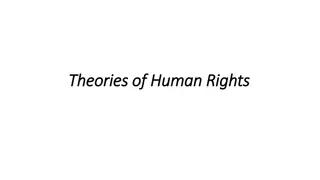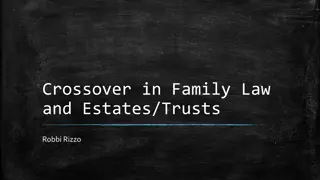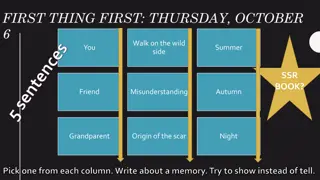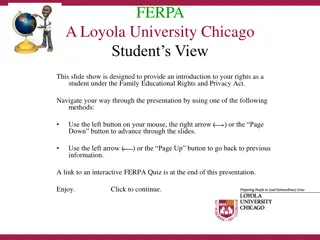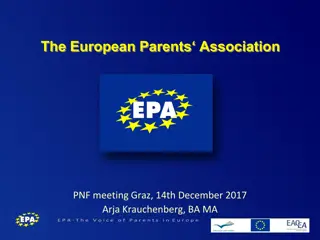Understanding Young People's Rights When Parents Separate
This resource provides guidance on young people's rights when parents separate, based on the United Nations Convention on the Rights of the Child, Article 12. It includes teaching slides for educators, curriculum alignment with the Curriculum for Wales, and emphasis on human rights education within the context of relationships and sex education. The content aims to empower learners to engage with contemporary issues, exercise their rights and responsibilities, and become ethical, informed citizens ready to contribute to society.
Download Presentation

Please find below an Image/Link to download the presentation.
The content on the website is provided AS IS for your information and personal use only. It may not be sold, licensed, or shared on other websites without obtaining consent from the author. Download presentation by click this link. If you encounter any issues during the download, it is possible that the publisher has removed the file from their server.
E N D
Presentation Transcript
The Rights Idea? Resource 2: Young people s rights when parents separate - United Nations Convention on the Rights of the Child, Article 12
TEACHER SLIDE PREPARING TO TEACH Preparing to teach and using these slides: The slides headed teacher slides assist the teacher in setting up the learning Slide 14 onwards are for the learner facing learning Please read the Teacher Guidance for The Rights Idea? (Resource 2) before teaching Have slides in presenter mode notes are available under each slide to aid teaching Support: and extension: activities suggested where appropriate (icons on bottom right corner of slides) Resources: Sticky notes An ask-it-basket / question box for learners to ask questions confidentially Handout for Quick fire quiz if using Save for the above, no additional teaching resources are needed to teach this learning. Timing: The learning will take place over 55 minutes.
TEACHER SLIDE THE CURRICULUM FOR WALES This resource for learners working at Progression steps 4 and 5 helps to meets two of the four purposes of the Curriculum for Wales assisting learners to become: ethical, informed citizens who: engage with contemporary issues based upon their knowledge and values understand and exercise their human and democratic responsibilities and rights and are ready to be citizens of Wales and the world. healthy, confident individuals who: are building their mental and emotional well-being by developing confidence, resilience and empathy know how to find the information and support to keep safe and well and are ready to lead fulfilling lives as valued members of society.
TEACHER SLIDE GUIDANCE ON RSE Curriculum for Wales Guidance on RSE states that RSE should: enable human rights by discussing RSE in the context of UNCRC rights highlight the right to be heard and involved in decision-making (Article 12) be positive, protective and preventative, considering how learners might need to be supported to understand and cope with change.
TEACHER SLIDE: STATEMENTS OF WHAT MATTERS In Resource 1, in considering how some young activists are getting their voices heard' and in Resources 1 and 2, learning some key rights under the UNCRC addresses a number of 'statements of what matters' such as this one from Humanities: Informed, self-aware citizens engage with the challenges and opportunities that face humanity, and are able to take considered and ethical action. In Resource 2, discussing parental separation and normalising the range of emotions that young people may go through when parents separate addresses a number of statements of what matters . For example, from Health and Well-being: How we process and respond to our experiences affects our mental health and emotional well-being. Healthy relationships are fundamental to our well-being.
TEACHER SLIDE PROGRESSION STEPS In Resource 1, in considering how some young activists are getting their voices heard and in Resources 1 and 2, learning some key rights under the UNCRC helps learners to reach a number of the Progression steps 4 and 5 such as this one from Humanities: Informed, self-aware citizens engage with the challenges and opportunities that face humanity, and are able to take considered and ethical action. In Resource 2, discussing parental separation, normalising the range of emotions that young people may go through when parents separate and discussing sources of support helps learners to reach a number of the Progression steps 4 and 5. For example, from Health and Well-being: How we process and respond to our experiences affects our mental health and emotional well-being. Healthy relationships are fundamental to our well-being.
TEACHER SLIDE YOUNG PEOPLES ART 12 RIGHTS The United Nations Convention on the Rights of the Child 1989 (UNCRC) Article 12 gives children the right to have their voices heard and their opinions listened to and taken seriously by adults. This includes the right to information, consultation and representation (if needed) when their parents separate. This does not mean that young people make the decisions the responsible adults (usually their parents) do, but young people have the right to have their opinions listened to. The weight placed upon those opinions will depend upon the age and maturity of the child. The parents of approximately 287,000 young people separate each year. Research indicates that children cope better when they are consulted about arrangements for them when their parents separate and that the arrangements made are longer-lasting, yet research shows they are often not consulted.
TEACHER SLIDE MYTH-BUSTING: MYTH 1 Myth 1: The only way to formalise a relationship is to get married. In fact: Mixed-sex and same-sex couples can get married or enter into a civil partnership (CP). Both require a court process to legally end the relationship if it breaks down (unlike cohabitation). Mixed-sex CP was introduced in 2019. Marriage and CPs are legal relationships, so require a legal process to end them. However parents do not need to attend court in person, this is an administrative process it need not be adversarial i.e. it doesn t have to be a fight.
TEACHER SLIDE MYTH-BUSTING: MYTH 2 Myth 2: After a certain period together/if you have a child together, cohabiting couples have the same rights as married couples: The common law marriage myth . In fact: unlike married or CPs, cohabiting partners are not entitled to claim financial support from their former partner for themselves if they separate (although both parents must financially support their children).
TEACHER SLIDE MYTH-BUSTING: MYTH 2 (CONT.) Cohabitation is the fastest growing family form in Wales and England. However, many cohabitants do not realise that they do not have the same legal rights as married couples or CPs. Parents must financially support children, but not each other. Rights to the couple s home are based on land law which, unlike family law, does not take into account contributions towards the family life leaving many stay at home or part-time working mothers financially disadvantaged. In 2018, research by the University of Exeter showed that 46% believed that cohabiting couples form a common law marriage when this is not the case, the so-called common law marriage myth .
TEACHER SLIDE MYTH-BUSTING: MYTH 3 Myth 3: Parents must go to court to sort things out In fact: Parents are strongly encouraged to agree finances and childcare arrangements without going to court. In the absence of safety concerns, parents are expected to work together to ensure that the children have a good ongoing relationship with both parents/regular time with each parent.
TEACHER SLIDE MYTH-BUSTING: MYTH 3 (CONT.) Myth 3: Parents must go to court to sort things out (cont.) Mediation is voluntary but where safety is not an issue, parents would be required to attend a meeting to find out about mediation before filing an application with the court to sort out finances or children. Children are entitled to speak to the mediator if they wish to do so. For those parents who apply to court, decisions around finances and childcare must be made in the best interests of the children. With childcare arrangements, the child's wishes and feelings will be taken into account, often by them speaking to the Family Court Adviser as Chloe and her family did (see video link to Welsh and English language versions is on slide 21). If parents aren't able to put their children's needs first then the child could be separately represented in the proceedings and organisations like NYAS Cymru can provide an advocate for the child if needed.
TEACHER SLIDE LEARNING AND SUGGESTED TIMINGS Activity Description Suggested Timing Introduction Learning objectives and outcomes; feedback on homework task 6 minutes Article 12 recap Learners will complete the gap-fill exercise to recap on Article 12 2 minutes Baseline activity Learners will draw a mind map of Tom s feeling, questions he may have and his support needs 6 minutes The grief cycle Learners will consider the grief cycle and how Tom s friend Samir could support Tom 6 minutes The Rights Idea? video Learners watch The Rights Idea? video noting 3 rights young people have when parents separate 7 minutes Quick fire quiz Learners will answer quick fire quiz questions based on The Rights Idea? video 3 minutes True or false True of false activity to assess learners knowledge 2 minutes Myth busting Learners will consider some common misunderstandings around legal rights 5 minutes Divorce process Learners will learn about changes to the law on divorce and consider the fairness of this 7 minutes Sources of support Learners will learn about the support available to young people whose parents separate 4 minutes Endpoint assessment Learners will revisit and revise the baseline mind map as appropriate 5 minutes Homework/extension Wrap up and setting homework/extension task 2 minutes
GROUND RULES We will: not disclose personal information about ourselves or others keep anything that others say confidential not judge others not put anyone on the spot and we have the right to pass talk about someone I know rather than using a person s name comment on what is said, not who has said it not ask personal questions or try to embarrass someone seek help in school/encourage friends to seek help if needed
THE RIGHTS IDEA LESSON 2 Learning objectives To learn about children and young people s rights to information, consultation and (if needed) representation if parents separate under Article 12 of the United Nations Convention on the Rights of the Child ( The UNCRC ) (including sources of support and how to access them). To learn about the legal system in Wales and England relating to relationship breakdown.
THE RIGHTS IDEA LESSON 2 Learning outcomes - learners will be able to: explain young people s rights under Article 12, UNCRC when parents separate describe the range of emotions that young people may feel when parents separate identify ways in which young people can be consulted if parents separate identify sources of support for these young people and explain how to access them explain the changes to the law relating to divorce and key differences between rights of married and unmarried couples on relationship breakdown in Wales and England.
THE RIGHTS IDEA: HOMEWORK TASK FEEDBACK By today you should have: Written about an issue that you would like to campaign about and why you think it is important Considered what right under the UNCRC your chosen issue addresses As part of this task, researched prominent activists who campaign for your chosen issue and considered what actions you could take yourself to campaign on this issue in the future.
ARTICLE 12: UNCRC ARTICLE 12 You have the _________ to give your ___________ and for __________ to listen, and take it __________. Obligation, adults, opinion, seriously, judges, casually, right
Baseline activity read the scenario below Draw a circle with the word Tom in the middle. Around the outside, write down: a) how you think Tom may be feeling; b) questions you think Tom may have at this time c) support you think Tom may need and any examples you know of support that may be available to him. Tom is 13 and an only child. Two weeks ago his parents told him that they had decided to separate.This was a big surprise to Tom as his parents didn't argue much. They said that they had drifted apart and reassured Tom that they both loved him and that nothing would change for him but hadn't really explained what that meant. There had been lots of hushed talks between his parents. Tom knew that they were talking about plans for him and felt excluded.When his dad was away,he had heard his mum crying in the bedroom, so didn't want to make her feel worse by asking questions.Tom only has a few close friends at school and their parents are still together, so he feels he doesn't have anyone to talk to.
YOUNG PEOPLES RESPONSES TO PARENTS SEPARATING Young people may show signs of: 1.Denial: feeling overwhelmed and bewildered 2.Anger: feeling frustrated, confused and angry 3.Depression: feeling sad all the time, longing for the past 4.Bargaining: changing their behaviour in the hope of getting their parents back together 5.Acceptance: a sense of understanding and a general desire to move forward
THE RIGHTS IDEA VIDEO As you watch this video make a note of the three things that Tom discovered that young people are entitled to under the UNCRC when their parents separate. The Rights Idea? Children and young people's rights when parents separate- Welsh language version The Rights Idea? Children and young people's rights when parents separate- English language version
QUICK-FIRE QUIZ 1. crucial 2. UNHEALTHY: All relationships go through ups and downs 3. HEALTHY: Respectfully dealing with issues as they arise keeps relationships on track 3. Speaks to children and reports to the court what the FCA thinks is in the children's best interests. 4. No, the FCA tells the court the views of the children although they sometimes speak to the judge directly if they wish. 5. Yes, if the court agrees, in rare cases they can apply and be represented separately. UNHEALTHY: Attraction is important but friendship is 1. 2. A mediator. A contact centre. 1. What is the name of the person who helps parents to reach an agreement without going to court? Where did Rosie have contact with her dad at first? 1. Relationship built mostly on FRIENDSHIP 2. BOTH PARTNERS SHOULD EXPECT IT TO BE PERFECT IF IT S NOT MOVE ON 3. CONFLICT DEALT WITH AT AN EARLY STAGE 4. What does a Family Court Advisor do? Do children have to go to court if their parents make an application to court? Can children make their own application to the court? 2. 3. 4. 5.
TRUE OR FALSE? 1. crucial 2. UNHEALTHY: All relationships go through ups and downs 3. HEALTHY: Respectfully dealing with issues as they arise keeps relationships on track 2. True. In Wales in 2020, the figures were 59% and 18% respectively. 3. False. Cohabitants rights depend on how property is owned not time together. 4. False. Unmarried couples do not have rights to financial support for themselves. 5. False. Couples are encouraged to resolve matters without going to court. UNHEALTHY: Attraction is important but friendship is 1. False. Since 2019 all couples have the option to enter into a civil partnership. 1. The only way to make a relationship legally recognised is to get married. More families with children under 18 in Wales, are married than living together. 1. Relationship built mostly on FRIENDSHIP 2. BOTH PARTNERS SHOULD EXPECT IT TO BE PERFECT IF IT S NOT MOVE ON 3. CONFLICT DEALT WITH AT AN EARLY STAGE 4. If you live together for at least two years, your rights are the same as if married. If you live together and have a child, your rights are the same as if married. To sort out arrangement for children after separation you must go to court. 2. 3. 4. 5.
INFORMATION MYTH BUSTING 1 Myth 1: The only way to formalise a relationship is to get married In fact: Mixed-sex and same-sex couples can get married or enter into a civil partnership (CP): both require a court process to legally end the relationship if it breaks down.
INFORMATION MYTH BUSTING 2 Myth 2: After a certain period together/if you have a child together, cohabiting couples have the same rights as married couples: The common law marriage myth In fact: Cohabiting relationships are the fastest growing family form in Wales and England but, unlike those who are married or in a CP, cohabitants are not entitled to claim financial support from each other if they separate (although both parents must financially support their children).
INFORMATION MYTH BUSTING 3 Myth 3: Parents must go to court to sort things out In fact: Parents are encouraged to agree child arrangements and finances without going to court if possible, but if they can t either parent can apply to the court for an order.
THE FAULT -BASED LAW ON DIVORCE Matrimonial Causes Act 1973: Fault-based divorce Applicant must show that marriage has irretrievably broken down by proving one of five facts (fault-based and separation based). Respondent can contest the fact. If successful, the Applicant can only divorce after five years. Uncontested divorce can be obtained within a few months but only if one of the fault-based facts is relied on.
CHANGES TO THE LAW ON DIVORCE Tom thinks that the fault- based law is outdated but Samir isn t so sure. In pairs create two lists one with at least 3 reasons why Tom thinks it is outdated and one with at least 3 reasons why Samir thinks it isn t.
THE NO-FAULT LAW ON DIVORCE Divorce, Dissolution and Separation Act 2020 Applicant (or Applicant and Respondent on a joint application) must show that the marriage has irretrievably broken down. Respondent cannot contest the divorce. Divorce can be obtained after 26 weeks.
SOURCES OF SUPPORT FOR YOUNG PEOPLE The National Association of Child Contact Centres (NACCC) Children s Commissioner for Wales The National Youth Advocacy Service, Cymru (NYAS Cymru) The Child and Family Court Advisory and Support Service, Cymru (Cafcass Cymru) Relate Cymru Childline Cymru
ENDPOINT ASSESSMENT ACTIVITY Return to the mind map you drew earlier and in a different colour add to your mind map by writing down: Any additional words for how you think Tom might have felt when his parents told him they were separating Any words for how you think Tom might have felt once he had learned of his rights to express his opinion and spoken to the mediator his parents saw? Where could Tom find information and support to help him at this time and in the future (giving specific examples of organisations)?
HOMEWORK OR EXTENSION TASK Look at the source of support for young people whose parents have separated which the teacher allocates to your table and be ready to share some information you learned from this research about children s rights when parents separate: National Youth Advocacy Service, Cymru: https://www.nyas.net/nyas-cymru/ (Tel: 0808 8081001) National Association of Child Contact Centres: https://naccc.org.uk (Tel: 01159 484557) Children s Commissioner for Wales: https://www.childcomwales.org.uk (Tel: 0808 801 1000) Cafcass Cymru: https://gov.wales/cafcass-cymru/family-separation (Tel: 0300 456 4000) Childline Cymru: https://www.childline.org.uk/info-advice/home-families/family- relationships/divorce-separation/ or for Welsh language version: https://www.childline.org.uk/get- support/contacting-childline/contacting-childline-in-welsh/ (Tel: 0800 1111) Relate Cymru: https://www.relate.org.uk/cymru/children-and-young-peoples-counselling (Tel: 03000030396)
HOMEWORK OR EXTENSION TASK (CONT.) National Youth Advocacy Service, Cymru: https://www.nyas.net/nyas-cymru/ (Tel: 0808 8081001) National Association of Child Contact Centres: https://naccc.org.uk (Tel: 01159 484557) Children s Commissioner for Wales: https://www.childcomwales.org.uk (Tel: 0808 801 1000) Cafcass Cymru: https://gov.wales/cafcass-cymru/family-separation (Tel: 0300 456 4000) Childline Cymru: https://www.childline.org.uk or for Welsh language version: https://www.childline.org.uk/get-support/contacting-childline/contacting-childline-in-welsh/ (Tel: 0800 1111) Relate: Cymru https://www.relate.org.uk/cymru/children-and-young-peoples-counselling (Tel: 03000030396) For the service allocated to you, research: Who is the service designed to support? How do they support people (e.g. online, telephone, text, etc.) and for what kinds of situations? What information is available on the website about young people s rights? How does the service help to protect young people s rights when parents separate?












